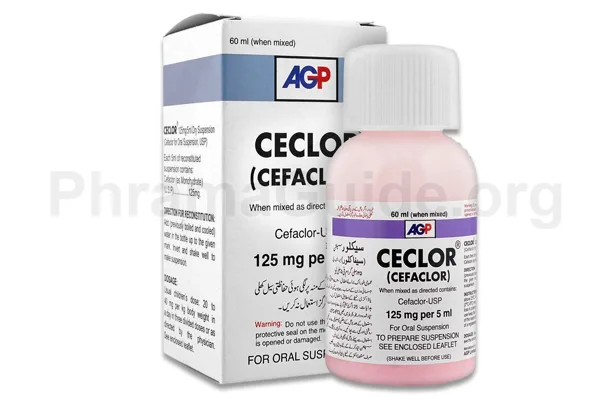Ceclor syrup is an antibiotic medication belonging to the cephalosporin class. It is primarily used for the treatment of various bacterial infections caused by susceptible organisms. Ceclor syrup is mostly recommended for children and adults where a low dose of medicine is needed. The following are common uses of Ceclor Syrup:
- Respiratory Tract Infections: Cefaclor syrup is often used to treat respiratory tract infections, including:
- Pharyngitis (sore throat)
- Tonsillitis
- Sinusitis (inflammation of the sinuses)
- Bronchitis (inflammation of the bronchial tubes)
- Pneumonia (infection of the lungs)
- Ear Infections: Ceclor syrup can be used to treat bacterial infections of the middle ear (otitis media) in both children and adults.
- Urinary Tract Infections: Ceclor syrup may be used for uncomplicated urinary tract infections (UTIs), such as cystitis, caused by susceptible bacteria.
- Skin and Soft Tissue Infections: Ceclor syrup can be effective in treating certain skin and soft tissue infections caused by susceptible bacteria, such as cellulitis and impetigo.
- Pharyngitis and Tonsillitis: Ceclor syrup may be used to treat bacterial infections of the throat, such as streptococcal pharyngitis (strep throat) and tonsillitis.
- Pediatric Infections: Ceclor syrup is commonly used in children for various bacterial infections, including those affecting the respiratory tract, ears, urinary tract, and skin.
Off-label Uses of Ceclor Syrup
- Prophylaxis in Certain High-Risk Situations: Ceclor syrup may be used off-label as a prophylactic treatment to prevent bacterial infections in specific high-risk situations. For example, in children with recurrent urinary tract infections or those undergoing certain surgical procedures, Ceclor syrup may be considered to prevent infection.

What is Ceclor?
Ceclor Syrup is one of the leading brands of Cefaclor in Oral liquid form, manufactured and marketed by AGP (Pvt) Ltd, Pakistan.
Ceclor Alternatives : Other Similar Brands
The following are some alternative brands of Ceclor Syrup and their manufacturers.
- Cefalor : Bosch Pharmaceuticals (Pvt) Ltd, Pakistan.
- Hiclor : Hilton Pharmaceuticals (Pvt) Ltd, Pakistan.
- Slate : Sami Pharmaceuticals (Pvt) Ltd, Pakistan.
- Cavalor : Barrett Hodgson Pakistan (Pvt) Ltd.
- Redyclor : Epoch Pharmaceutical, Pakistan.
- Cefanol : Abbott Laboratories (Pakistan) Ltd.
- Afalor : Bio Labs (Pvt) Ltd, Pakistan.
- Cefgard : Standphamr Pakistan (Pvt) Ltd.
- Cetaclor : Highnoon Laboratories Ltd, Pakistan.
- Deucef : Searle Pakistan (Pvt) Ltd.
- Exlor : Indus Pharma (Pvt) Ltd, Pakistan.
Ceclor : Available Formulations and Strengths
Presently, Ceclor is available in Syrup, Drops, and Capsule forms.
Ceclor Syrup is available in three strengths:
- 125mg/5ml
- 187mg/5ml
- 250mg/5ml
Ceclor Drop:
- 50md/ml
Ceclor Capsules:
- 250mg
- 500mg
Who Should Not Use Ceclor?
Ceclor syrup has certain contraindications, which are situations where the use of Ceclor is not recommended due to potential risks or adverse effects.
Hypersensitivity: Ceclor syrup should not be used in individuals with known hypersensitivity or allergy to Ceclor or other cephalosporin antibiotics. Allergic reactions can range from mild skin rash to severe anaphylaxis, a life-threatening allergic reaction.
History of Severe Allergic Reactions: Individuals who have experienced severe allergic reactions, such as anaphylaxis or Stevens-Johnson syndrome, to other beta-lactam antibiotics (e.g., penicillins) should avoid Ceclor syrup.
History of Severe Gastrointestinal Disorders: Ceclor syrup should be used with caution or avoided in individuals with a history of severe gastrointestinal disorders, particularly colitis or pseudomembranous colitis, as antibiotic use may exacerbate these conditions.
Renal Impairment: Ceclor is primarily eliminated through the kidneys. Therefore, dosage adjustments may be necessary for individuals with severe renal impairment or end-stage renal disease. Close monitoring of kidney function is important.
Phenylketonuria (PKU): Ceclor syrup contains phenylalanine, which can be harmful to individuals with phenylketonuria, a genetic disorder that affects the metabolism of phenylalanine. Special consideration and monitoring are required in individuals with PKU.
What is the Recommended Daily Dosage of Ceclor Syrup?
Use Ceclor syrup in Pediatric Patients with the following dosage guidelines:
- Ceclor Dose for Ear infections:
- Acute Otitis Media: 20 mg/kg/day divided into two to three doses.
- The maximum daily dose should not exceed 1 gram.
- Ceclor Dose for Respiratory Tract Infections:
- Pharyngitis/Tonsillitis: 20 mg/kg/day divided into two to three doses.
The maximum daily dose should not exceed 1 gram. - Sinusitis: 20 mg/kg/day divided into two to three doses.
The maximum daily dose should not exceed 1 gram. - Bronchitis: 20 mg/kg/day divided into two to three doses.
The maximum daily dose should not exceed 1 gram. - Pneumonia: 40 mg/kg/day divided into two to three doses.
The maximum daily dose should not exceed 1 gram.
- Pharyngitis/Tonsillitis: 20 mg/kg/day divided into two to three doses.
- Ceclor Dose for Skin and Soft Tissue Infections:
- Cellulitis/impetigo: 20 mg/kg/day divided into two to three doses.
- The maximum daily dose should not exceed 1 gram.
- Ceclor Dose for Urinary Tract Infections:
- Cystitis: 20 mg/kg/day divided into two to three doses.
The maximum daily dose should not exceed 1 gram. - Pyelonephritis: 40 mg/kg/day divided into two to three doses.
The maximum daily dose should not exceed 1 gram.
- Cystitis: 20 mg/kg/day divided into two to three doses.
How Ceclor Works?
Ceclor is a second-generation cephalosporin antibiotic that exerts its mode of action by inhibiting bacterial cell wall synthesis. The cell wall is an essential component of bacteria that provides structural support and protects the cell from external factors. Ceclor interferes with the formation of the bacterial cell wall, leading to cell wall instability and eventual cell death.

Leave A Comment